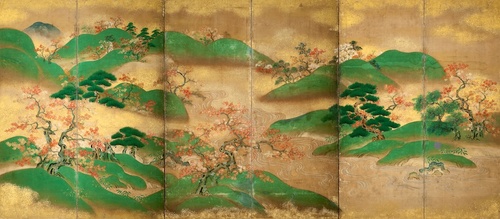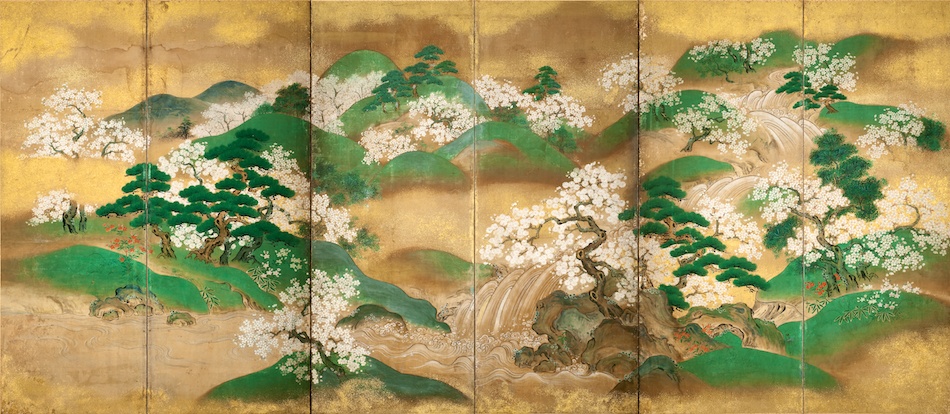Early Edo Period (17th c.)/Color on paper, pair of six-fold screens
165.5 x 367.0 cm (each)
SUMMARY
Entering the Edo period, the Kano school’s extravagant and lively style of the Momoyama period was innovated into a refined and elegant style by Kano Tanyu. Tanyu freshly incorporated techniques from Yamato-e, and pioneered a new kind of painting called keibutsu-ga (“scenic view painting”) which took the four seasons and customs in famous places in Japan as its subjects. The cherry blossoms of Mt. Yoshino as well as the autumn leaves of Tatsuta River as seen painted in this piece have also been used as themes of waka poetry to represent spring and autumn, and are traditional subjects of art that have been popular since ancient times. The expression of golden clouds and mist using cut foil and gold dust over the entire screen, the depiction of the flowing water, and the contrast between the spring cherry blossoms and autumn leaves are all beautiful. Here, by subduing the uninhibited depictions of trees and rocks characteristic of the Kano school and allowing the calm and subtle style of Yamato-e in the flowering trees and mountains to stand out, the artist succeeds in drawing out the pleasant charm of nature.
ARTIST
Kano School
The largest school of Chinese-style painting in Japanese art history. Spanning about 400 years from the late Muromachi period to the beginning of the Meiji period, and played a major role in the history of painting. Its founder was Kano Masanobu, chief painter of the Muromachi shogunate. The school would later produce such excellent painters as Kano Motonobu and Kano Eitoku, and came to hold supremacy in painting circles. In the Edo period, the Edo Kano school which included artists such as Kano Tanyu. For generations, the school came to grant its painters guaranteed status as chief painters of the shogunate.
List of artworks by the same artist
INFORMATION

Friday, October 8 - Sunday, November 14, 2021
From the Tokyo Fuji Art Museum Collection: “THIS IS JAPAN” Eternal Japanese Art Oita Art Museum (Oita, Japan)
Sunday, August 25 - Sunday, September 29, 2019
This Is Japan In Kyoto From The Tokyo Fuji Art Museum Collection The Museum of Kyoto (Kyoto, Japan)
Saturday, October 6 - Sunday, February 10, 2019
Flowers of Immense Charm–A Masterpiece Exhibition by Four Major Museums National Taiwan Museum of Fine Arts (Taichung, Taiwan)
Friday, July 28 - Saturday, August 26, 2017
Edo Period Paintings 21st Century Museum of Contemporary Art, Kanazawa (Kanazawa, Japan)
Saturday, November 15 - Sunday, January 18, 2015
The Quintessence of Japanese Paintings Takasaki Tower Museum of Art (Gunma, Japan)
Saturday, October 12 - Sunday, November 24, 2013
The Quintessence of Edo Period Painting Nara Prefecture Complex of Man’yo culture (Nara, Japan)
Wednesday, June 29 - Sunday, August 7, 1994
The Beauty and Spirit of Japan: Treasures of Japanese Art from the TFAM Collection National Museum of Colombia (Santafe de Bogota, Colombia)
Friday, February 4 - Sunday, March 27, 1994
Treasures of Japanese Art from the TFAM Collection The Art Gallery of the Chinese University of Hong Kong (Shatin, Hong Kong, China)
Sunday, January 26 - Sunday, March 22, 1992
Treasures of Japanese Art from the TFAM Collection Kunstlerhaus (Vienna, Austria)
Saturday, August 10 - Sunday, October 20, 1991
Behind Golden Screens: Treasures of Japanese Art from the TFAM Collection – An Official Event of Japan Festival ’91 and the Edinburgh Festival National Museum of Scotland (Edinburgh, UK)
Saturday, March 3 - Tuesday, April 10, 1990
Eternal Treasures of Japanese Culture: Beauty and Spirit of Japan National Museum of Fine Arts (Buenos Aires, Argentina)
EXPLORE

You can search and browse content on a platform across museums and archival institutions nationwide, and create My Gallery (online exhibition).

You can view the work in High-resolution.



